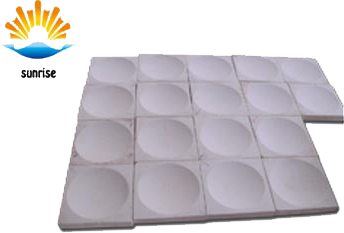The quality of the glass products greatly depends on the material, structrue and accuracy of the glass molds. The material of glass molds should meet the following requirements.
Glass molds should meet the the following requirements of the working conditions:
1) Wear Ressitance
When glass has plastic deformation in the mold, it will flow and slide along the surface of the molds, which will generates intense friction between the mold and glass. This will lead to the failure of the mold due to wear. Therefore, the wear resistance of the mold is very important.
Hardness is the main factor affecting wear resistance. In general, the higher the hardness of the mold, the smaller the amount of wear, the better the wear resistance. In addition, the wear resistance of the mold is also related to the type, quantity, shape, size and distribution of carbide in the mold.
2) Stregnth and Toughness
The working conditions of the mold is mostly very severe. Some often bear large impact load and become brittle and easy to break. In order to avoid the sudden fracture of the mold during working, the mold should have higher stregnth and toughness. The strength and toughenss of the mold is mainly up to the carbon content, grain size and organisation status.
3) Resistance To Fatigue And Fracture
The mold, during the working process, is under long-term cyclic stress which will cause fatigue and fracture. The fatigue and fracture can be caused by small energy repeated impact, strengtching, contact and bending. The resistance to fatigue and fracture is mainly up to stregnth, toughness, hardness and the content of the inclusion in the mold.
4) High temperature properties
The high service temperature will reduce the hardness and strength of the mold and cause early wear and the failure of the mold due to plastic deformation. The mold material should have high resistance to tempering and stability to ensure it has higher hardness and strength at service temperature.
5) Resistance to cold and hot fatigue
Some molds will be subjected to repeated cooling and heating during the working process, which will strength the mold surface and turn the pressure into stress. This will cause the mold surface cracking and peeling, increase the friction, hinder the plastic deformation, reduce the size accuracy of the mold and finally cause the failure of the mold. The cold and hot fatigue is one of the main reasons that cause the failure of the mold, so the mold should have higher resistance to cold and hot fatigue.
6) Resistance to corrosion
Glass mold is in frequent contact with the high temperature viscous glass, so glass mold should have good resistance to corrosion.
Glass molds should also meet the technical requirements of the process. The manufacturing of the mold generally include the following steps: forging, machining and heat treatment. In order to ensure the quality of the mold and reduce the production cost, the material should have good malleability, machinability, hardenability and grinding ability. It should also have low decarburizing sensitivity and low potential of oxidizing and quenching distortion and cracking.
1) Malleability
The mold should have lower forging deformation resistance, plasticity, a wide forging temperature range and low potential of cold cracking and precipitation of network carbides.
2) Annealing
It should have a wide spheroidizing annealing temperature range, low annealing hardness, mall fluctuation range and high spheroidizing rate.
3) Machinability
It should have large cutting parameters, low tool loss and low surface roughness.
4) Oxidizing and Decarburizing Sensitivity
It should have good resistance to oxidizing at high temperature, slow decarburizing and non-sensitivity to heating media and small pitting tendency.
5) Hardenability
It should have uniform and high surface hardness after quenching. After quenching it can get deeper hardened layer and can be hardened with mild quenching medium
6) Quenching distortion and cracking tendency
It should have small conventional quenching volume change and low potential of warping, slight distortion and abnormal deformation. It should have low conventional quenching and cracking sensitivity and non-sensitivity to quenching temperature and working conditions.
7) Grinding ability
It should have low grinding wheel loss, no burn limit, large grinding dosage, non-sensitivity to the quality of the grinding wheel and cooling conditions and low potential of galling and cracking.
When selecting materials for the mold, economy should be taken into consideration and the manufacturing cost should be reduced as much as possible. Therefore, when the properties and performance have met the requirements, select the cheap ones. Besides, the production and supply should be taken into consideration too.
Zhengzhou Sunrise Refractory is a refractory supplier from China. We provide various refractory materials for glass furnaces as weel as new type glass mould brick.

